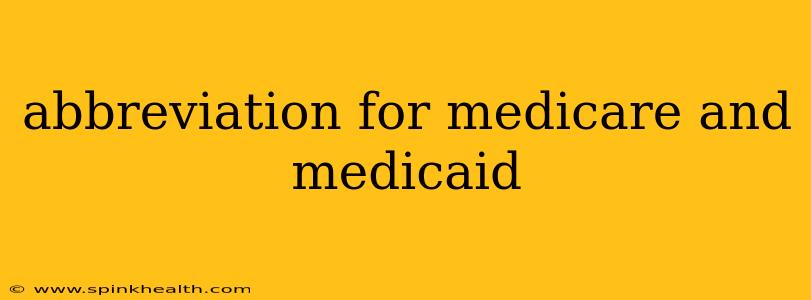Navigating the world of healthcare in the United States often feels like deciphering a secret code. Two of the most frequently encountered acronyms are Medicare and Medicaid, programs vital to millions of Americans. But what do these abbreviations actually stand for, and what are their key differences? Let's unravel the mystery.
While there aren't commonly used abbreviations for "Medicare" and "Medicaid" themselves—the terms are usually used in full—understanding what they cover is crucial. Thinking of easily remembered abbreviations might help you personally, but officially, they remain as they are. Let's explore the nuances of each program to grasp their significance.
What is Medicare?
Medicare is a federally-funded health insurance program primarily for individuals aged 65 or older and certain younger people with disabilities. Imagine it as a safety net woven by the government to ensure access to essential medical care during retirement or in times of disability. It's not a single program, but a collection of four parts:
-
Part A (Hospital Insurance): Covers inpatient hospital care, skilled nursing facilities, hospice, and some home healthcare. Many qualify for Part A without paying a premium because of their work history.
-
Part B (Medical Insurance): Covers doctor visits, outpatient care, medical supplies, and some preventive services. Most people pay a monthly premium for Part B.
-
Part C (Medicare Advantage): Offered by private insurance companies, Part C provides an alternative to Original Medicare (Parts A and B). It often includes additional benefits, such as vision, hearing, and dental coverage. Premiums and cost-sharing vary by plan.
-
Part D (Prescription Drug Insurance): Helps cover the cost of prescription medications. Individuals must enroll separately and pay a monthly premium, which can vary depending on the plan chosen.
What is Medicaid?
Medicaid, on the other hand, is a joint state and federal program providing healthcare coverage to low-income individuals and families. Think of it as a helping hand for those who need financial assistance to access essential medical care. Eligibility criteria vary from state to state, but generally include factors like income, family size, and disability status. Medicaid offers a broader range of benefits than Medicare, often including coverage for services not covered under Medicare, such as long-term care.
Frequently Asked Questions (FAQs)
Let's tackle some common questions surrounding Medicare and Medicaid:
What is the difference between Medicare and Medicaid?
The key difference lies in who qualifies. Medicare is primarily for individuals 65 and older or those with certain disabilities, regardless of income. Medicaid is for low-income individuals and families, regardless of age. Medicare is federally funded, while Medicaid is a joint federal and state program.
Can I have both Medicare and Medicaid?
Yes, it's possible to be eligible for both Medicare and Medicaid. This is often referred to as "dual eligibility" and is common among elderly and disabled individuals with limited incomes. The combination helps cover gaps in coverage and ensures access to a wider range of healthcare services.
How do I apply for Medicare and Medicaid?
The application process differs for each program. For Medicare, you typically apply through the Social Security Administration (SSA). For Medicaid, you apply through your state's Medicaid agency. Information on how to apply is readily available on the respective websites.
How are Medicare and Medicaid funded?
Medicare is primarily funded through payroll taxes, while Medicaid is jointly funded by the federal government and individual states. The federal government provides matching funds to the states based on their per capita income.
What are the benefits of Medicare and Medicaid?
Medicare provides access to essential healthcare services for seniors and the disabled, helping to ensure their well-being in later life. Medicaid ensures access to healthcare for low-income individuals and families, reducing financial barriers to essential medical care and improving overall public health outcomes.
Understanding the nuances of Medicare and Medicaid is crucial for navigating the complexities of the US healthcare system. While there are no widely accepted abbreviations, remembering the core distinctions between these vital programs can empower individuals to access the healthcare they need.

